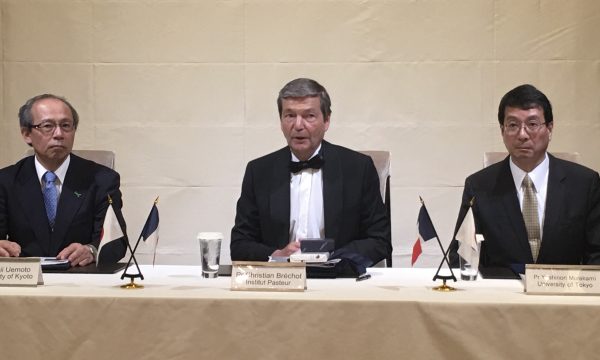These days, I have been lucky to be invited to attend several unique parties, receptions and dinners. Barring a few, most were public events, and some were organized by embassies.
Just to give you a general idea, I attended the following events:
Birdlife International’s annual fundraising gala, (the honorary president, Princess Takamado, was unable to attend owing to the mourning for Prince Mikasa’s passing), the commemoration of the creation of the Pasteur Japan Foundation through the collaboration of Institut Pasteur, Tokyo University and Kyoto University, The official unveiling ceremony of the Intilaq Tohoku Innovation Center (in Japanese) by the Qatar Friendship Fund, The Norwegian embassy’s reception for the visit of Norway’s foreign minister, and other events organized by the French embassy, the Swiss embassy, the Dutch embassy, and the British embassy.
At one embassy, I was invited to a small lunch that would be attended by ‘around 10 people’. Turned out that I was the only Japanese invitee, the rest being Minister and the entourage of 5, and the ambassador and his staff. After some small talk, the conversation turned to the current situation in Fukushima after the nuclear disaster, as the Minister sought to learn more. Ever since I headed the NAIIC, I have found myself in similar situations more than few times.
Indeed, I recall that I was once specifically asked for by a visiting foreign dignitary, who was tired of receiving incomprehensible and non-committal replies when he had asked government officials and representatives of Japan about the kind of response Japan was planning in the aftermath of the Fukushima Daiichi Nuclear Disaster. Even taking into account the fact that there may be some errors arising due to translation, the policies of the Japanese government post-Fukushima requires some truly mind-bending and convoluted logic. It is really difficult to explain it in simple terms, probably because there is dissonance between the observations and conclusions. No wonder the hapless government officials were unable to provide reasonable answers. It is disturbing that, although the Fukushima Daiichi disaster ranks right up there as one of the worst nuclear disasters the world has seen, the response cannot be explained to a global audience.
I have written extensively about this worrying issue in the book ‘Regulatory Capture’ (in Japanese), released in March this year. It is not a trifling matter; for it deals with the trust that lies at the heart of national governance.
